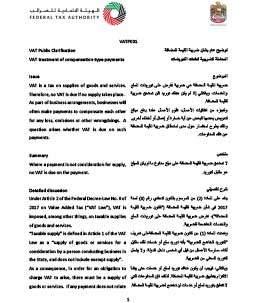-
Statutory Audit
We conduct an integrated audit, which combines the financial statement audit,independent and objective assurance on financial information, transactionsand processes.
-
Limited Review
We offer services relating to reviews of historical financial informationby expressing negative assurance on such historical financial information.
-
Agreed Upon Procedures
We engage with organisationsto perform specific procedures and report findings to conform to their needs.
-
Financial Reporting Advisory Services (FRAS)
Our team provides timely advice on the impact of accounting changes to assist businesses in the development of an appropriate implementation roadmap.
-
Business Consulting
Grant Thornton UAE provides organisations with implementable plans that drive sustainable growth strategies to grow and optimise their business performance.
-
Business Risk Services
Organisations need to understand risks thoroughly to be able to manage them better. Grant Thornton UAE helps businesses achieve the best balance between minimising risk exposure, optimising profitability and developing compliance review checklists.
-
Regulatory Advisory Services
Grant Thornton UAE's extensive understanding of the overarching supervisory framework within the region equips our professionals to support financial institutions comply and abide by the set of regulatory mandates throughout the rapidly evolving ecosystem.
-
Financial Advisory
Grant Thornton UAE works with organisations on transactions from start to finish, assisting with strategy, identifying risks, executing deals, and helping to unlock their potential for growth and value creation.
-
Restructuring Advisory
Grant Thornton UAE is committed to realising value for shareholders, in a way that recognises and supports the interests of all stakeholders. Our solutions maximise value, provide clarity and direction, and accelerate recovery and transformation for businesses.
-
Technology Advisory & Cybersecurity
IT and technology are fundamental to drive the performance of businesses. Through leveraging the power of technology, Grant Thornton UAE helps organisations define and identify growth opportunities to achieve value-driven transformation and innovation.
-
Forensics
Fraud and corruption pose a growing challenge worldwide. As the commercial landscape changes, an increasingly regulated environment requires stringent governance and compliance processes. Grant Thornton UAE helps organisations navigate challenges and crisis with a hands-on approach coupled with the use of technology.
-
ESG Services
The Environment, Social and Governance (ESG) agenda has gained significant traction over the years, to become one of the key strategic aspects of any business. It is imperative that all organisations, irrespective of industry sector, engage with their stakeholders and prioritise ESG practices to unlock sustainable growth opportunities.
-
Business Process Solutions
Our team at Grant Thornton offers comprehensive and cost effective outsourced solutions, enabling stakeholders and business owners to focus on their core business goals.
-
Corporate Tax
Our diversified team of corporate tax subject matter experts combines a perfect blend of international experience across several industry sectors, technical expertise, and commercial nuances with a commitment to deliver exceptional value to your business.
-
VAT
The VAT team at Grant Thornton is well versed with the VAT Laws applicable across the region and holds valuable experience and professional accreditation in assisting clients across diverse industries to comply with the VAT obligations.
-
Transfer Pricing
Grant Thornton UAE assists its clients in providing transfer pricing solutions that are implementable and operational, considering the facts and concerns of its clients.
-
International Tax and Tax Due Diligence
Grant Thornton UAE supports multinational groups to optimise their tax structures. We can also assist businesses in analysing existing group transactions and inter-group supplies, as well as advising on potential implications of various taxes to facilitate an efficient Group tax structure.
-
Economic Substance Requirements
Economic Substance rules were introduced in the UAE in 2019, requiring UAE businesses that undertake certain ‘Relevant Activities’ to maintain and demonstrate adequate substance.
-
Customs and International Trade
The team at Grant Thornton is positioned centrally to assist the businesses with global cross-border tax structuring, planning and compliance needs.
-
Excise Tax
We provide Excise Tax related advisory and compliance services to the producer, importer, and the storekeeper of excisable goods
The Federal Tax Authority (FTA) recently issued a public clarification on the treatment of Value Added Tax (VAT) on compensation payments. The issue discussed in the clarification relates to whether VAT is due on payments made by one business to compensate another business for any loss, omission or wrongdoings.
The UAE VAT laws provide that in cases wherein payment is not made as consideration for a supply of goods or services, the obligation to pay VAT on such supply does not arise.
With the help of this clarification, the FTA has laid down the following principles that should be used to determine if VAT should be due on compensation payments:
- A contractual payment to compensate for loss
- A payment to settle a dispute
- A fine or penalty
- Payment for damaged goods
A Contractual Payment to Compensate for Loss
The best example for such a case is liquidated damages. Liquidated damages are the amounts agreed between the parties at the time of signing the contract in case any party breaches the contract. The rationale to pay the amount is not in relation to any supply of goods or services but to make good the loss suffered by one party due to commission/ omission of an act by other party. Thus, such payments are outside the scope of VAT.
Examples are – Early termination of contract or late performance of service.
It is pertinent to note that such payments do not include the cancellation charges charged by the hotel for cancellation of a booking irrespective of the room being available to the guest or not since the charges are taken for cessation of a right, which is a supply of service by the hotel and thus, chargeable to VAT.
A Payment to Settle a Dispute
The clarification provides that in cases wherein a dispute is settled and payment is awarded to a party, it is imperative to consider the reason behind the payment to determine treatment of VAT. Following are some of the cases wherein VAT treatment has been identified:
| S.no | Cases Discussed | Treatment of VAT |
| A | Payment made to enforce a contractual term | Since payment is a consideration for the contractual supply, VAT is applicable |
| B | Payment in the nature of compensation for any loss suffered | Payment is not a consideration for the supply and thus, outside the scope of VAT |
| C | Payment in return for granting a right | Payment is treated as consideration for the supply and hence, chargeable to VAT |
A Fine or Penalty
Fines and penalties are outside the scope of VAT as the charges are imposed for contravening the terms of an agreement or performing an unlawful act or breach of statutory obligations.
Examples: Speeding fine or fine for incorrect parking
Payment for Damaged Goods
If payment is made to compensate the damage or loss done by one party to the another or for breach of pre-existing terms of contract, VAT is not applicable as such payments are outside the scope of VAT.
However, as an exception to above if the customer has broken a product and is obliged to take title of the broken product, payment made by the customer represents consideration for the supply of goods and thus, VAT is applicable.
Conclusion
The clarification provides that to determine whether a payment should be treated as consideration for a supply or not, nomenclature or the labels related to the payments should be ignored. The parties should consider the contractual or legal arrangements and charge VAT accordingly.
Download the VAT Clarification on Compensation Payments

